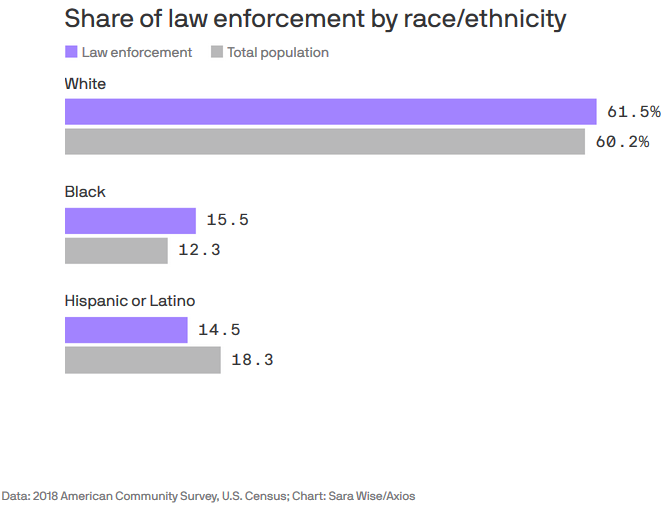
I was reading this Axios article earlier and it raised the question in my mind: “If the number of non-white cops has increased but the amount of police brutality incidents against non-whites has not decreased, perhaps the problem is not race, but culture.”
I have had this theory for some time – that it is one’s culture that influences one’s behavior more than one’s race.
I think that many would agree with this statement, yet it then raises more questions.
Culture can refer to much more than one’s national or ethnic group’s behaviors, traditions, etc. Culture is defined by Merriam-Webster as:
1a: The customary beliefs, social forms and material traits of a racial, religious, or social group
1b: The set of shared attitudes, values, goals, and practices that characterizes an institution or organization.
merriam-webster.com
It is the second definition there that is applicable to a police force.
If there is a culture of force and disregard for human life in a department or unit, regardless of an officer’s race she or he will be susceptible to adopting that culture and the associated behaviors. A black officer is just as likely to use needless force as an Hispanic officer if the culture of which they are both a part glorifies and encourages such actions.
It is an age-old argument of nature vs. nurture. I argue that in most cases, nurture conquers nature.
If a black child who was born to parents who lived in the ghetto and subscribed to the stereotypical “ghetto” culture was adopted, as an infant, by Korean parents and taken to live in Seoul, what culture and behaviors would it exhibit at age 10, having grown up in the traditional Korean culture?
Attributing a person’s behavior to their race is quite an archaic idea. The very thought that increasing the number of non-white police officers would decrease the abuses of power that police are accused of is frankly insulting to everyone involved. The non-white officers are somehow meant to be more sensitive to other races? Which implies then, that all white officers are more likely to be insensitive to other races. Does this take into account the number of white officers who might be married to a non-white person? Who may have been adopted or had role models who were non-white?
In Nazi Germany, Germans killed other Germans who were not loyal to Hitler’s cause. When the ideology is strong enough and differences are emphasized over similarities, men will kill their “own kind” for not holding the same belief system.
Too much emphasis is put on race, and on our differences. Race is not what separates us, as humans; the color of our skin or the shape of our noses or eyes or the texture of our hair is not what truly distinguishes us from one another – what does that is our culture – and what brings us together is our beliefs.
Our beliefs are not dictated by our race or ethnicity. I do not have to be a Christian or a Republican because I am white; I can choose to be Muslim or Hindu, a Socialist or a Libertarian.
Beliefs are more important than one’s race. More people throughout history have died for or been killed for their beliefs than for their race. We must bond through our shared beliefs, rather than be driven apart by our physical differences. Even those who disagree politically can find some common ground through a respectful discussion of beliefs.
I have witnessed racism from people of many different races and ethnicities; it is not a white problem, it is a human problem and it should be addressed as such. A single race is not responsible for all the racism in America or the world – it is cultures that allow racist ideas and glorify one group’s culture over others that are the problem.
In the end, we are all more alike than we are different, and we must move forward together rather than continue to be pushed apart.
